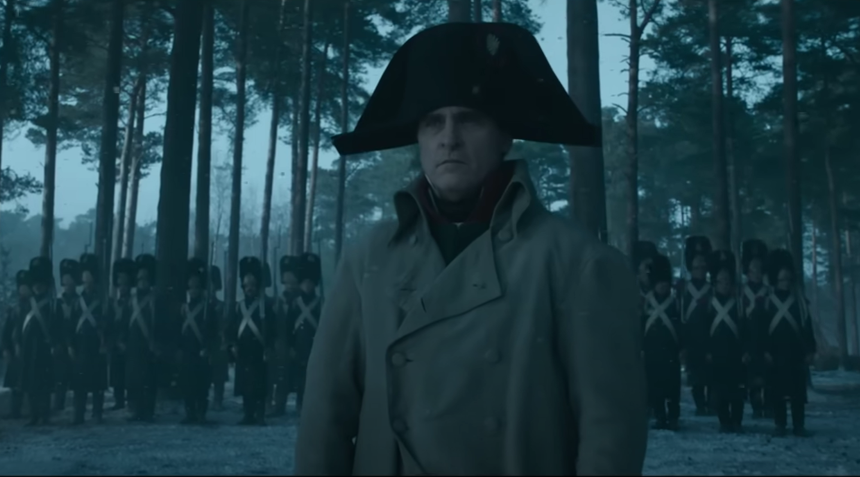
Jason Matthews.
This post is from Jason Matthews. Jason is a conflict simulation designer and Napoleonic miniatures junkie. His titles include Twilight Struggle, Imperial Struggle, and 1960: The Making of the President.
The easiest headline to write about the new Napoleon film is “Ridley Scott Meets His Waterloo.” I have already seen it in print a half dozen times. However, that headline vastly mischaracterizes the experience of this movie.
Waterloo was epic. Waterloo was singular. Waterloo was such a close-run thing. Win or lose, participation meant something. You were part of history.
This film has no business being mentioned in the same breath as Waterloo. It is another bumbling Austrian or Prussian defeat. It is Wagram or Jena, but not Waterloo.
If MGM and Cecil B DeMille had been given an enormous budget in the 1950s to create a historical epic with guys in shakos rather than togas, we might have gotten something approximating Napoleon. It is sort of shocking that a director of Scott’s pedigree was so set on doing a Napoleonic biographic, and seems to have settled on the simplest, arguably least interesting, aspect of Napoleonic life — his codependent relationship with Josephine.
Tragically even here, we get the Hollywood romance devoid of nuance. If you replace Josephine with Elizabeth Taylor’s rendition of Cleopatra, that’s about the quality of the history and story you’re getting. And it’s impossible to walk out after two and a half hours without thinking Scott wasted this film, focusing entirely on the wrong thing.
Imagine for a second you wanted to tell this story, then perhaps we should have had an actress five years older than Napoleon (as Josephine was). A mature aristocrat, who was Napoleon’s political partner and helped open the doors with France’s establishment. This was the service that the young upstart military officer truly required of Josephine on his rise to power.
But in 2023, we get none of that. We get Napoleon as a victim; and his wife as a strumpet. To say this harkens back to the era of cinemascope and technicolor is a very charitable way to describe a script that borders on misogyny.
So, okay. Let’s put down the history books. (Scott self-professed to having left all the reading to the screenwriter). Let’s just enjoy a big Hollywood movie! But, eh, no.
Much of what’s wrong here is Scott’s nostalgic casting of Joaquin Phoenix as Napoleon. When Scott “discovered” Phoenix and cast him as a Roman emperor in Gladiator 23 years ago, he may have looked the part.
Phoenix is now in his fifties. And he very much looks the brooding, ailing, back-against-the-wall Napoleon of Waterloo. But he fails utterly as the dashing young artillery officer stunning the world and climbing the pinnacle of power with dizzying speed.
There is, essentially, no development of Napoleon as a character in this film at all. He’s born a middle-aged man who, we are told but not particularly shown, is a military genius. He has a pathological attachment to Joséphine de Beauharnais. Two and a half hours later, Waterloo. The end.
This film is also simply not French enough. The supporting cast reads like a seasonal list of The Crown. We can’t quite decide if the French should indicate their foreignness by speaking in an English accent or not. But a French accent is attempted by exactly no one. The result is an Anglo-Saxon aping of French manners and culture in a very dull “nation of shopkeepers” way.
Napoleon’s messy marriage to Josephine is only notable if you’re English observing the French. This is an era where civil marriages and “no-fault” divorces were put into law for the first time anywhere in the Western world. Of course, the English aristocracy was looking down their stuffy, Anglican noses in disapproval.
But inside the French context, what is going on is not that interesting. Nor are the affairs and lovers that both Napoleon and Josephine took throughout their marriage of much import inside French culture. The French have always been more modern in their approach to these subjects. This film’s fixation with it has a puritanical quality of an outsider looking in.
So, left on the cutting room floor is the interesting French tale. The story of an outsider who is constantly in search of respectability. Napoleon was a Corsican: practically an Italian, by Parisian standards. He took Republican France by storm. He wound up abandoning his early Republican ideals to crown himself so that he could again be taken seriously by Europe’s royal houses.
This is the narrative that sort of better captures the long arc of this man’s life and his impact on world history. It is the “Napoleonic complex” writ large. He overturned the world order. He created the era of nationalism and revolution.
Napoleon is wildly clever, quotable, and energetic. He is witty and sharp in that French way that so irritates the English. He had a magnetism that seemed almost beyond comprehension. He inspired blinding devotion and confidence in ways only a few names in history could equal.
But not here. Not in Ridley Scott’s film. This is a dour and gray man with a seemingly displaced Oedipal complex transferred from his mother to Josephine.
Nolan’s Dunkirk is 100 times more successful. One of the keys to its success is that it tells a series of small stories in the context of this enormously significant event. Scott seems to be trying to do the same here—tell a banal love story in the context of the greatest upheaval in Europe since the fall of Rome.
But it fails. Because he puts the small story on the shoulders of one of history’s most interesting figures. And the lost opportunity glares through the entire film.
There is so much history that’s wrong or mischaracterized that I won’t go into it. It’s weirdly aggravated because so many little historical details are spot on. And there are moments of history captured in amazing cinematic beauty for the first time in this film.
But there is one sin for which I will never be able to forgive this film fully. At Waterloo, Napoleon charges with Ney’s cavalry.
That’s right. The little artilleryman responsible for the conduct of thousands of men and officers during the battle for his Empire mounts up and charges — to be defeated by the Scots Greys. And that’s how Waterloo ends. Jesus, Mary, and Joseph.
Clearly, Scott has no idea how to capture Napoleon’s military brilliance and personal bravery on film. Maybe he should have spent more time watching Patton. Maybe I should have as well.
In the end, we still don’t have a great Napoleon film.
You can follow Jason on Twitter here.
